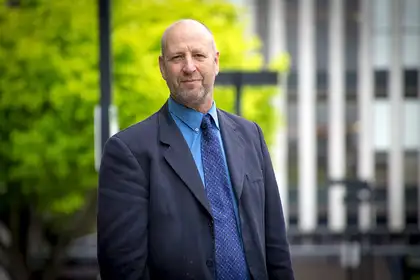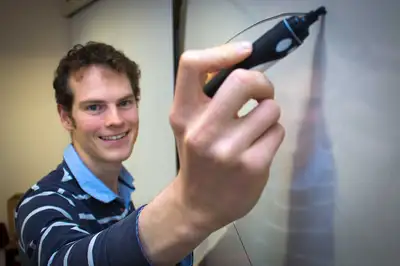
Professor Don Cleland.
A Massey professor with a long career of excellence and a young PhD researcher have been celebrated at the Te Apārangi Research Honours Awards dinner.
Hosted by Royal Society Te Apārangi at the Dunedin Town Hall, the awards celebrate New Zealand’s best and rising researchers.
Professor Don Cleland, of the School of Food and Advanced Technology, was awarded the Scott Medal while PhD student Christian Offen was awarded the 2019 Hatherton Award.
Professor advances refrigeration
The Scott Medal recognises Professor Cleland’s outstanding research into optimising the design and operation of refrigeration technologies.
Professor Cleland's research has provided a suite of performance prediction methodologies that are used by industrial refrigeration practitioners to optimise the design and operation of cold-chain and heating technologies. Specific areas he has focused on include predicting the effect of product shape on rates of freezing, thawing, cooling and heating. He has worked on evaluating heat pumps for more energy efficient industrial food processing, including their use for spray drying. He has also been involved with the design of a heat pump for domestic water heating, which is currently undergoing trials.
In receiving the medal, Professor Cleland said it was an honour to be recognised. “Refrigerated food has been the backbone of New Zealand’s economy. I hope that my work has helped make the sector more competitive and sustainable. Throughout my career, I was fortunate to have strong mentorship, particularly from Dick Earle and my brother Andrew, that helped me focus on activities with high impact for New Zealand and to get good financial and industry support for my work. As a researcher in an applied field, I believe that research, consultancy/commercialisation and extension teaching are all essential and complementary components of a programme of work, and that a focus on research and academic publication alone, is likely to limit impact. I have tried to be active in all the aspects of this ‘triple helix’ to maximise my impact on the sectors relevant to my work.
“I would like to thank my long-term employer, Massey University, for the opportunities and support that they have provided for me over the last 40 years. Most importantly, the support of my family, particularly my wife Joanne, has been critical to my success.”

PhD student Christian Offen.
Hatherton Award
Mr Offen, of the School of Fundamental Sciences, was awarded the 2019 Hatherton Award, which is for the best scientific paper by a PhD student.
His paper develops a new framework for a class of non-linear differential equations, which are the basis for modelling many problems in science and technology, including biological pattern formation, viscous fluid flow phenomena, chemical reactions and crystal growth processes.
The paper explores the nature of bifurcations in very wide class of problems, namely Hamiltonian boundary value problems. Using advanced geometry and analysis, Mr Offen created a new framework for studying these bifurcations. He has found his framework has allowed him to discover new features. For example, some common types of boundary conditions restrict which types of bifurcations can occur. In addition, he discovered a new phenomenon that he christened the ‘periodic pitchfork bifurcation’, in which one solution turns into three, passing through a periodic state.
Mr Offen’s initial research has had wide applications and has led on to five further papers. He is currently at the Newton Institute at Cambridge University in England.
Mr Offen said the important discovery that led to the paper came early on during his PhD studies and pursuing the idea paid off. “The paper will be the central piece of my PhD thesis and provided a starting point for several other papers. I am grateful to my colleagues for all their support, especially my co-author and supervisor Robert McLachlan.”